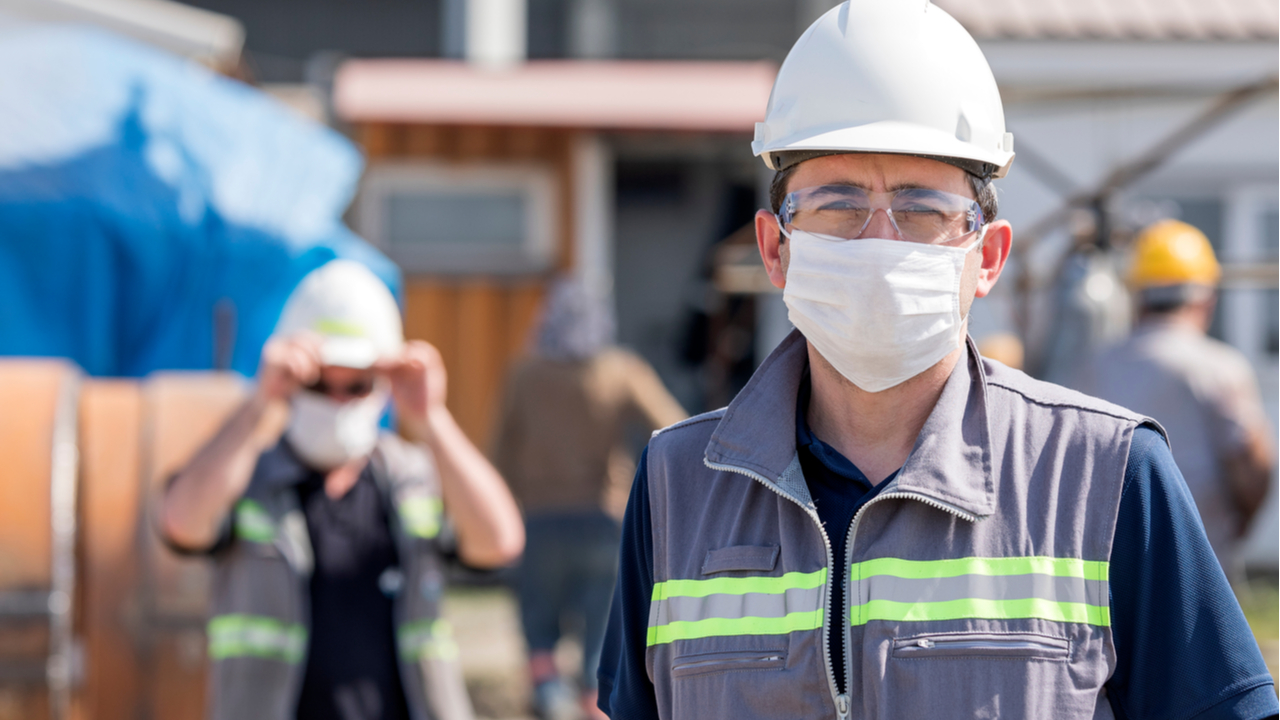About
About the Alliance
News and Events
Membership
Membership Types
Member Highlights
Services
Safety Assessments + Consultations
Advisor Services
Leadership and Psychological Safety Services
Training
CATALOG AND UPCOMING CLASSES
Resources
By Type
OHS Competency Tools and Framework
COR / OSSE
Getting Certified
Certification Tools & Training
Recognition & Awards
Navigation
Member Highlights:
Safety Assessments + Consultations: Air Quality Assessment, Combustible Dust Assessment, Confined Spaces Assessment, Critical Incident Response Services, Ergonomics, Machine Safeguarding Assessment, Noise Hazards | Surveys and Testing Services
Advisor Services: Safety Needs Analysis | GAP Analysis, Safety Program Support (SPS) | Safety Compliance Support (SCS)
Leadership and Psychological Safety Services: Mental Health and Wellness at Work, Leadership Training and Coaching, Respectful Workplace Support
By Type: Checklists, Guidebooks, Presentations, Quick Reference Cards, Safety Awareness Posters, Safety Videos, Templates, Toolbox Talks, Webinars
OHS Competency Tools and Framework:
Getting Certified: Steps to OSSE Certification, COR for Small Business, Safety Needs Analysis | GAP Analysis, COR / OSSE Small Business Referral Program, Certified OSSE/COR External Auditors
Certification Tools & Training: OSSE/COR Audit Tools, OSSE/COR Reference Materials, Certified OSSE External Auditor Training, OSSE/COR Internal Auditor Training
12
Months
of Safety
of Safety
May 2024
Workplace Wellness
Supporting employee well-being is crucial to building a healthy workplace environment. From physical well-being to stress management and mental resilience, strong and healthy employees are happier, more productive, and better able to support their colleagues and teams.
Basic Training
Fatigue is more than feeling tired and drowsy. Work fatigue is mental or physical exhaustion that reduces a person’s ability to work safely and effectively. This course explores fatigue-related risks in manufacturing, factors that influence fatigue, and solutions to mitigate the risks.
Course
Mental health is feeling good about who you are, having balance in your life, and managing life’s challenges. It is the responsibility of both employers and employees to protect and promote mental health in the workplace to ensure people are psychologically safe. For an introduction to the fundamentals of workplace mental health, start with this 1-hour online course.
Mental Health Awareness in the Workplace is a lunch and learn—style workshop, available at no charge to Alliance members. Contact us to schedule this awareness training in person at your facility or or virtually.
In this 6-hour, instructor-led course for leaders, learn to recognize and battle the stigma surrounding mental health. Understand the impact of mental health and mental illness on your team and on your own work—and how to respond to a worker in distress.
In this 45-minute, self-paced online course, workers learn to identify common signs and symptoms of mental health issues, to recognize stigma and reduce the impact. They learn practical strategies to respond to a co-worker experiencing a mental health issue.
Course
Lunch and learn–style awareness workshop tailored for those seeking to bolster their inner strength and adaptability in the face of challenges. Free for Alliance members.
Workplace WellnessHealth and Safety Resources and Tools
Ale (KSW Lawyer): If an employer terminates an employee within six months due to the injury, they may be liable for breaching the Duty to Maintain Employment. The determining factor is whether the termination was related to that worker’s compensable injury. WorkSafeBC wants to dissuade employers from terminating injured workers due to their injury and […]
Ale (KSW Lawyers): The Duty of Maintain Employment is not indefinite; it runs to the second anniversary of a worker’s date on injury. If a worker has been unable to return to work over two years from the date of injury, the obligation to maintain employment ends.
This workbook is intended for: Working people with low mood, who may be at risk for developing depression; Working people who have developed a mild or major depression; Partners, family members, friends or workplace colleagues who want to help; Employers, supervisors or managers concerned about their staff; Treatment providers who would like a tool to use as an adjunct to their clinical treatment.
Workplace mental health has never been more important. BC’s Hub for Workplace Mental Health is here to help.
Website
BounceBack® is a free skill-building program designed to help adults and youth 15+ manage low mood, mild to moderate depression, anxiety, stress or worry. Delivered online or over the phone with a coach, you will get access to tools that will support you on your path to mental wellness.
Teresa (WorkSafeBC): A worker can, but they are not obligated to, share their medical information. Many doctor’s reports can include information that is not relevant to the claim and is the confidential, private, information of the worked. For medical information to help identify suitable work, you can direct a worker to physiotherapy for the completion […]
TeksMed Service: Employers should keep in mind they do not NEED to wait for medical to make an offer of suitable/modified work. They can base the offer off common-sense restrictions (Ie: one-handed duties for a left-hand injury). Also, other treatment providers can provide limitations or assist in reviewing modified work (Ie: Physiotherapist). As WCB receives […]
Teresa (WorkSafeBC): The new legislation provides a legal framework for supporting an injured worker’s return to, or continuation of work.
Toolbox Talk
Recent changes to the Workers Compensation Act outline new requirements such as the Duty to Cooperate and the Duty to Maintain Employment for work-related (compensable) injuries. Both employers and workers are now legally required to maintain communication with each other and WorkSafeBC, participate in suitable work, and maintain a worker’s employment in many cases.
This resource from the National Safety Council identifies some strategies that employers can adopt to help minimize workplace fatigue.
Some information from the National Safety Council about what exactly is workplace fatigue, its causes, and how it can impact an organization’s health and safety.
Toolbox Talk
Fatigue is feeling tired weary from sleep, mental or physical work, or stress. Boring repetitive tasks can increase feelings of fatigue. Fatigue is either acute or chronic.
This document answers some of the frequently asked questions relating to mental disorder claims.
Website
Guarding Minds at Work is a comprehensive resource to help you assess and address psychological health and safety in your workplace.
Teresa (WorkSafeBC): There is no limit prescribed. If the work is being completed regardless of accommodations than there is no effect. If providing accommodations becomes an undue hardship, then that will be reviewed. Make sure you document why an accommodation is not possible. Amanda (TeksMed Services): There is no set figure.
A resource developed by WorkSafeBC to help employers develop their return-to-work (or stay-at-work) plan for workers experiencing a psychological injury.
Amanda (TeksMed Services): Being on Probation does not bar a worker from claim, however the Duty to Maintain employment only applies to workers who have been employed for at least 12 months. Many workers have underlying or pre-existing conditions, the Board can consider accepting this as only an aggravation to a pre-existing condition and/or may […]
Teresa (WorkSafeBC): The duty to cooperate requires workers to “not unreasonably” refuse suitable work when it is made available by an employer with whom the worker has an existing employment relationship. If a worker refuses work duties that are suitable and available, WorkSafeBC will investigate to determine the reasonableness of the worker’s refusal. If WorkSafeBC […]
Ale (KSW Lawyer): The Duty to Cooperate is reciprocal. Employees also have a duty to communicate with the employer and WorkSafeBC. Failure to do so puts them at risk of losing claim benefits. The Duty to Cooperate is applicable to cases where a worker is disabled from earning full wages, even if they were employed […]
Ale (KSW Lawyers): Terminating a worker and paying them termination pay does not automatically cancel the Duty to Maintain Employment obligations. Employers may still be required to establish that the termination was unrelated to the injury under the WorkSafeBC system. Whether there was a breach of the Duty to Maintain Employment is determined on a […]
Mental Health and Wellness at Work Get advice, support, and training on critical workplace mental health and wellness topics Awareness of mental health and well-being is crucial in promoting a healthy workplace environment. Understanding mental health issues, resilience, and stress management equips employees with the knowledge and skills to manage their own well-being and support […]
Presentation
This presentation was shared by Dr. Steve Conway, MSABC Mental Health and Wellness Director through a webinar on the impacts of organizational change on mental health on November 27, 2024.
safetyalliancebc.ca
About the project The Manufacturing Safety Alliance of BC is working with industry, mental health, academic, government, and labour experts to develop a mental health strategy for the manufacturing sector. This strategy and plan will define a way forward to enable employers to integrate psychological health and safety into their OHS management systems. Manufacturing Sector […]
safetyalliancebc.ca
FREE MSABC MEMBER WORKSHOP | Mental Health and Wellness at Work Do you or your team face stress and possible burnout? On March 25, we are co-hosting a FREE in-person workshop for Lower Mainland members to help you guide your workers to become stronger and more resilient during these turbulent times. Led by Dr. Steve Conway […]
Unfortunately, due to stigma and unfair stereotypes about mental illness, it can be difficult for people to speak up about their mental health. It can be a lot easier to share that you have a physical illness, an injury, or some other form of physical disability than it is to disclose that you’re going through a mental health crisis.
Toolbox Talk
1 in 5 people will experience a mental health problem in their lifetime. Poor mental health can adversely affect all areas of a person’s life. Mental health related concerns can show up in the workplace in different ways, and can include changes to a person’s attitude, behaviour, and performance, as well as physical symptoms such […]
Mental Health First Aid is the help provided to a person developing a mental health problem, experiencing a mental health crisis, or a worsening of their mental health.
Toolbox Talk
The workplace can be an essential factor to maintain positive mental health – but it can also be a stressful environment that contributes to mental health issues. When our mental health starts to deteriorate, it can be hard to enjoy life like we used to. The total cost from mental health problems to the Canadian […]
Website
We spend a great deal of our time at work, and the financial and human costs of workplace mental health issues can be huge.
Msabc Event
Make It Safe Expert Series Workshop | Free Members-Only Event
This engaging session will cover workplace mental health awareness, addressing crucial topics such as bullying and harassment. Discover effective strategies for building resilience—and equip yourself and your team to overcome challenges and thrive at work.
This engaging session will cover workplace mental health awareness, addressing crucial topics such as bullying and harassment. Discover effective strategies for building resilience—and equip yourself and your team to overcome challenges and thrive at work.
Teresa (WorkSafeBC): I am not sure if that has been a consideration, as it is outside of my department, but if you would like to know, please send an email so that I can forward it to the appropriate department and try to find an answer for you.
Conference Session
2025-10-08 08:30:00
Transforming Crisis into Opportunity – Lessons in Resilience Life throws curveballs at us all. Whether it is a personal setback or a business challenge, how we respond can define our success. Meet Dan MacQueen, a resilient speaker who’s been there and conquered adversity. Dan’s life took an unexpected turn when a brain hemorrhage left him […]
Registration OpenTo foster a pragmatic integrated approach to workplace mental health in Canada, the Workforce Advisory Committee (WAC) of the Mental Health Commission of Canada (MHCC) collaborated with the Centre for Applied Research in Mental Health and Addiction (CARMHA) at Simon Fraser University to examine the relevant scientific and ‘grey’ literature on approaches to improving the mental health of employees.
Teresa (WorkSafeBC): Undue hardship refers to a point at which accommodating a worker becomes too difficult, unsafe, or costly for the employer. WorkSafeBC determines if the situation meets the undue hardship criteria on a case-by-case basis, taking into account the specific circumstances of each situation. Employers are obligated to identify and offer work that is […]
Toolbox Talk
When employees practice self-care and wellness, they are better able to cope with the demands of their job. This toolbox talk helps your team better understand the difference between self-care and wellness and why both are important in helping us stay safe every day.
Talking about mental health at work can be challenging. But becoming more aware of signs of mental illnesses, and learning how to have those difficult discussions are part of being an effective leader.
Quick Reference Card
A stay-at-work/return-to-work program provides the financial, social, and psychological benefits and stability of remaining in the workforce while injured or unwell.
Conference Session
2025-10-08 13:55:00
Explore practical, evidence-informed strategies to support safe and timely return to work following injury or illness—including psychological injuries. After a brief presentation on the essential principles and best practices, you’ll get hands-on with quick-start tools to create your customized recover-at-work toolkit, addressing a range of factors—from diverse workplaces and job roles to operational realities. Get […]
Registration Open“Workplace wellness is a commitment by an employer to cultivate a work environment that promotes the health and wellness of its employees.”
If you have someone in your family with a mental illness, you may be wondering what is going on.
Virtual services are available for British Columbians who are experiencing anxiety, depression or other mental health challenges.
Amanda (TeksMed Services): Employers should keep in mind they do not NEED to wait for medical to make an offer of suitable/modified work. They can base the offer off common-sense restrictions (Ie: one-handed duties for a left-hand injury). Also, other treatment providers can provide limitations or assist in reviewing modified work (Ie: Physiotherapist). As WCB […]
Amanda (TeksMed Services): This depends on the circumstances, failure to report is not always necessary a bar to claim but can be depending on the situation and circumstances. One would need to review the specifics for a recommended action, but generally one can always ask WCB to investigate or if the factors are strong enough […]
Ale WorkSafeBC: keeps a record of the phone calls throughout a claim. Case Managers often summarize conversations after speaking to a worker or an employer. You can find this under the “Communications” tab via the online claim portal. The call centre may also “log” a message that you leave for the Case Manager, Vocational Rehabilitation […]
Teresa (WorkSafeBC): In response to your question, it seems that you are asking about the DTME and how to communicate to the employer that they cannot terminate an employee who may not meet the DTME because they were recently hired. The DTME applies to employers who regularly employ 20 or more workers and workers who […]
Ale (KSW Lawyers): WorkSafeBC can adjudicate whether the worker is expected to remain in the accommodated role and whether they are entitled to wage loss benefits in these cases. Since the Duty to Maintain Employment poses a positive duty on the employer to find alternate work, exploring alternate accommodation/position may be required if the current […]
WorkSafeBC offers a Return to Work Coordinator course. It is a two-day course focuses on the role and responsibilities of a return-to-work (RTW) coordinator, providing participants with the information, tools, and templates that will allow them to do the job. The course focuses on the value of a proactive approach, which provides support for an injured […]
Ale (KSW Lawyer): Employers are expected to accommodate a worker to the point of undue hardship, the point at which it is too difficult, unsafe, or expensive to remove barriers so that injured workers can return to work. If creating a new position is financially unfeasible for a business, the employer can establish that doing […]
This website links to and references a study funded by NIOSH that looks at the long-term impacts of workplace injuries on workers.
Toolbox Talk
Workplace bullying and harassment are behaviours that hurt, threaten, or frighten another person and can take many forms. Bullying and harassment can happen in any workplace, even if it’s not always obvious. This toolbox talk will help supervisors and managers begin the discussion with staff around recognizing and identifying workplace bullying and harassment.
An information fact sheet from WorkSafeBC with some basic information and links to legislation regarding bullying and harassment. Contains information for employers and workers.
Please take a few minutes to participate in our workplace mental health survey (approximately 5-7 minutes). Your feedback is important to help us create a workplace mental health strategy that works for ALL manufacturers in British Columbia.
Conference Session
2025-10-09 08:30:00
Fatigue is a chameleon. It disguises itself as a rules violation, a lapse of attention, non-compliance, or more often, “human error”. Organizations deal with the consequences of fatigue-related errors and incidents on a regular basis without even knowing it. It is time to open our eyes to see how fatigue lurks not only in our […]
Registration OpenConference Session
2025-10-09 08:30:00
Learn new strategies to develop and implement a thriving culture of mental health and well-being. See the benefits in employee retention, fewer lost days, and higher efficiency. Take away the knowledge, skills, and tools to facilitate communication, manage behaviours, and support employees struggling with their mental health. Specifically designed for leaders, this workshop would be valuable for business owners or […]
Registration OpenConference Session
2025-10-09 13:00:00
Learn new strategies to develop and implement a thriving culture of mental health and well-being. See the benefits in employee retention, fewer lost days, and higher efficiency. Take away the knowledge, skills, and tools to facilitate communication, manage behaviours, and support employees struggling with their mental health. Specifically designed for leaders, this workshop would be valuable for business owners or […]
Registration Open
News & Blog Articles
When we talk about physical safety in high-risk industries like manufacturing, construction, or warehousing, we often focus on procedures, PPE, and compliance. But there’s another powerful, and often overlooked, factor that significantly impacts physical safety: a respectful workplace culture. Respect saves lives. ...
Who does this impact? WorkSafeBC has announced that in 2024, as part of their Planned Inspections Initiative, they will be focusing inspections on the following manufacturing classification units (CUs). Historically, workers in these CUs are at higher risk for serious injury....
Editorial from TeksMed Services on Bill 41
December 6, 2023
Editorial: TeksMed Services Inc. As a disability management consultant, TeksMed Services Inc. regularly counsels employers on return-to-work requirements and issues. The following is an article TeksMed published on their own website for their clients and has agreed to share it...
As the Omicron wave continues in British Columbia, many employers report unprecedented worker shortages with employees calling in sick. Some authorities have estimated that workplaces could see up to a 30% reduction in their typical workforce. Almost every employer has...
Beyond the mask – life after the pandemic
December 14, 2021
by Andrea McKinlay Exploring the psychological experience of taking off our masks. While many of us dream of the day we can step into a mask-less future, the thought of discarding them for good is a source of anxiety for others. For many, the...
Creating a workplace that supports mental health
March 11, 2021
An innovative work environment enhancement program from Sensitivity Training Canada, the 3-Step Respect in the Workplace Sensitivity Training program helps create workplaces that support mental health. Employers are required to protect the mental health of their employees while they are...
A contributing factor in 13 percent of workplace injuries, workplace fatigue also has a costly financial impact on businesses. A study in the Journal of Occupational and Environmental Medicine found that US businesses lose more than $100 billion per year...
About MSABC
Board & Governance
Contact Us


























